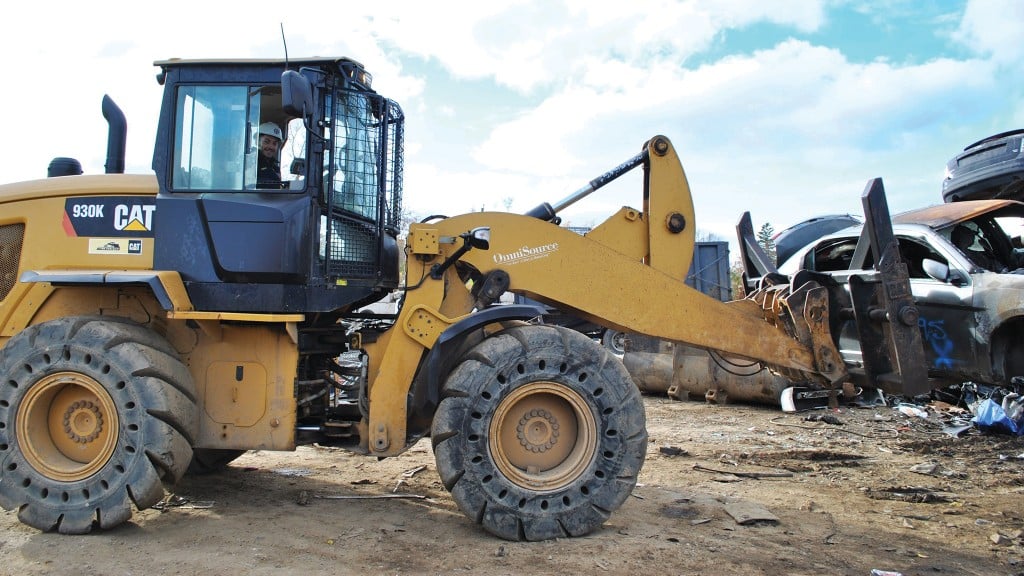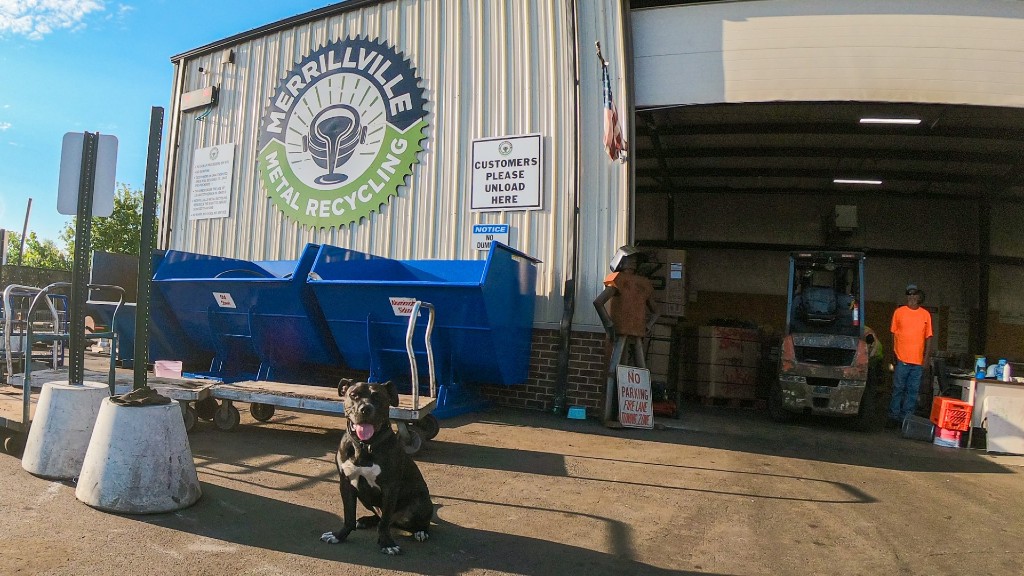First-generation innovation at Merrillville Metal Recycling
Merrillville Metal Recycling embraces modern strategies unburdened by industry norms

In an industry steeped in tradition and often dominated by legacy companies, Merrillville Metal Recycling stands out as a first-generation scrapyard bringing a modern perspective to the world of metal recycling.
CEO Jake Bronstein's fascination with the scrap metal industry began during a visit to a scrapyard as a child and spilled over into adulthood as he pursued a career at a metal recycling facility in Illinois. Armed with a deep understanding of the industry and an entrepreneurial drive, Bronstein eventually ventured into Merrillville, Indiana, founding Merrillville Metal Recycling in 2020. Since then, the company has expanded to include two facilities with the recent acquisition of Benton Metal Recycling in Michigan.
First-generation freedom
Unlike its multi-generational counterparts, Merrillville Metal Recycling has the freedom to chart its own path unburdened by the legacies and conventional practices that many generational companies grapple with. By leveraging modern approaches, cutting-edge technology, and transparent business practices, Merrillville Metal Recycling's fresh perspective allows it to embrace change and shape the future of recycling in ways that are both innovative and sustainable.
"I think the pro of being a first generation is that you have a clean slate. You're not dealing with legacy issues that a lot of generational companies fight, whether that be software, culture, assets, or accounting," says Bronstein. "You have the opportunity to do things right the first time around. Obviously, you're not going to get everything right, but there's less resistance to change."
While first-generation companies have the freedom to create their strategies and explore opportunities with a level of flexibility that larger companies often struggle to achieve, they also lack the experience that older, multi-generational businesses have accrued over time.
"The con is that nothing is guaranteed," continues Bronstein. "People learn from their failures, their trials and tribulations, right? So if you're doing something for a hundred years, there are proven methodologies. There's proven processes and procedures that produce similar outputs. When we're starting from scratch, it's really kind of a trial-by-error nature. Sometimes the lessons have more upsides and sometimes the lessons are a little more expensive, but that's how you grow."
Custom scrap metal management programs
With the circular economy at the heart of everything it does, Merrillville Metal Recycling provides a wide range of services for both ferrous and non-ferrous materials, including designing and implementing custom scrap management programs.
"We do some full processing where we'll actually process the material for our customers and they have complete control over their own inventory. They market their material as-is and they get the receivable off of that. We just process the material to spec," says Bronstein. "There's other times where we provide tolling for them. So we're managing their supply chain, not only scrap metal generation and waste, but also helping them procure finished product that will go into their manufacturing process."
By taking supplied materials, processing them into finished products, and returning the resulting products to the original company, Merrillville Metal Recycling's tolling services provide a closed-loop system for its customers with the added advantage of streamlining supply chains, simplifying raw material procurement, and allowing for vendor consolidation.
"It's more so just finding the pain points of our customers and developing solutions for it," says Bronstein. "So whether that's on-site processing, or helping them have better control of their waste streams, or if they want to monetize their own waste streams and take the risk on themselves, we'll help them do that. Whether it's a consultation so that they can reduce their carbon footprint through technology or through processing, or maybe something that reduces the amount that they're spending on transportation, these are all things that we're open to. There's no one-size-fits-all."
Data plays a key role
When it comes to running a successful business, having a thorough understanding of data and how it affects day-to-day operations is a critical component. The technology revolution of recent years has been rapid, enabling a deeper dive into data analysis and inventory management that allows recyclers to make more informed decisions.
"Given where scrap prices are, coupled with the volatility, there's real risk management controls that need to be put in place in order to preserve capital and to grow. I think a lot of the time, it used to be extremely speculative, where there's really no insight into inventory. You didn't understand how long something was aging or understand throughput in terms of inventory and weren't really managing risk from that standpoint. But data and emerging software technologies, particularly AI, are changing the ways in which we approach these businesses and manage risk," says Bronstein. "I think using technology to better understand your financials and data will allow you to be less wasteful operators."
But technology's influence doesn't just stop at data analysis and inventory management. The recycling industry is rapidly adopting AI-driven algorithms for decision-making, material transport, and trading, introducing a level of automation that reduces human error and increases precision. Bronstein emphasizes the importance of employing software and artificial intelligence for inventory and data analysis, as well as leveraging these technologies to create algorithms for trading.
"Those are the things that we're looking to deploy," says Bronstein. "The more that we can automate and have less human interference or bias within our trading platform, the better."
How Merrillville Metal Recycling cultivates company culture
Even with artificial intelligence on the rise, human workers remain irreplaceable. While the scarcity of skilled labour, an aging workforce, and ever-evolving waste streams present unique challenges, they also present a unique opportunity for the next generation. According to Bronstein, those who are dedicated to their work can find not only a career, but a purposeful journey within the realm of recycling.
"If I was a young person, I would go where there could be possible wage inflation. The available supply of young, talented labour within our industry is pretty limited, and a lot of the operators in our industry are older in age, so there's a demographic divide and that creates an opportunity," says Bronstein. "There's a knowledge gap, and people pay for knowledge. This isn't the sexiest business. This is hard work. This is boots on the ground, operationally intensive, logistically intensive, and capital intensive."
And when it comes to the future, Bronstein believes the companies that will differentiate themselves are the ones that can attract and retain talent. To propel them in this, Merrillville Metal Recycling recently joined the Recycled Media syndicate - a media group that teams up with key players in the industry to help spread recycling awareness - to launch Recycled Indiana. Through this, Merrillville Metal Recycling utilizes podcasts, social media, and other modern channels to connect with a broader audience to attract new talent, form business connections, and highlight the critical role of scrap metal recycling.
"We want to have a large footprint within the space, whether that be domestically or internationally. Within the next couple of years, we'll probably focus on acquisitions and building out horizontal and vertical infrastructures as it relates to recycled materials, and we'll look to bring on more people and attract younger talent," says Bronstein. "In order to grow our footprint, buy more facilities, and get into more complex forms of metal manufacturing, we need to attract talent. And that means continuously working on our culture and providing the beneficial upside to future team members."
Today, Merrillville Metal Recycling's business approach revolves around the strategic integration of technology, marketing, and a commitment to transparency in its practices, setting it apart not only in its methods, but also in the cultural shift that it's embraced within the recycling industry.
As Bronstein puts it, "Historically, the way it was set up was that there was a hierarchy within organizations, and there was a huge barrier to entry between employees and management. There was more of an authoritarian leadership style, where I think today you're trying to focus on collaboration, and you're trying to bring in and establish synergies between the different areas of your company to create a well-oiled machine and involve everyone within the growth process."
With an emphasis on open communication and investing in its employees, the company has cultivated an environment where workers can carve out their own work portfolios and explore growth strategies with a complete line of sight.
"Being somewhat of a startup company, you can really create your own footprint and be successful. And if you want to pursue a go-to-market strategy, or a growth strategy, or if there's an opportunity to buy a company or another facility, all of the cards are on the table," says Bronstein. "There's a level of transparency, because we sit here and we actually share financials and data with our sales team and our operations team because we believe that they're stakeholders within our success. For a lot of other companies, information and data is pretty guarded."
As Merrillville Metal Recycling continues to grow and evolve, Bronstein envisions a company that not only expands its footprint through acquisitions and facility developments, but also places a strong emphasis on developing a workforce that is aligned with building a more sustainable future.
"We'll continue to invest and innovate and get like-minded people that are looking to add value as we transition to a greener and more circular economy," says Bronstein. "It has to be purposeful. There has to be a maniacal urgency, and that's the way that we operate."



